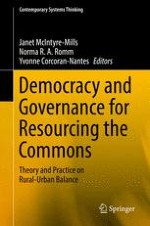
2019 | OriginalPaper | Chapter
1. Summary of the Papers and Relevance of Mixed Methods for Resourcing the Commons
Authors : Janet McIntyre-Mills, Norma R. A. Romm
Published in: Democracy and Governance for Resourcing the Commons
Publisher: Springer International Publishing
Activate our intelligent search to find suitable subject content or patents.
Select sections of text to find matching patents with Artificial Intelligence. powered by
Select sections of text to find additional relevant content using AI-assisted search. powered by